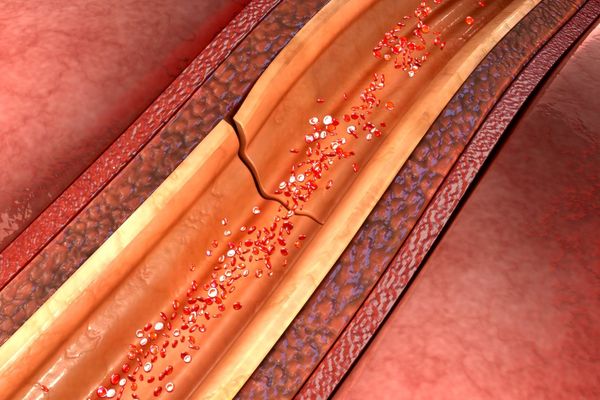Triglycerides are lipids, a fatty substance found in your blood. Any time you eat, your body turns calories it doesn’t need right away into triglycerides that are stored in fat cells. These triglycerides are then released between meals to provide energy.
When a person regularly takes in more calories than they burn, their triglyceride levels may get too high. High triglycerides are linked to clogged arteries (atherosclerosis), which may lead to cardiovascular problems such as heart disease, stroke and heart attacks. And very high triglyceride levels may lead to inflammation of the pancreas, called pancreatitis.
How are triglycerides measured?
Triglycerides are measured with a simple blood test, often done as part of a cholesterol test known as a lipid panel. The range of triglycerides is:
- Normal — Less than 150 milligrams per deciliter (mg/dL), or less than 1.7 millimoles per liter (mmol/L)
- Borderline high — 150 to 199 mg/dL (1.8 to 2.2 mmol/L)
- High — 200 to 499 mg/dL (2.3 to 5.6 mmol/L)
- Very high — 500 mg/dL or above (5.7 mmol/L or above)
People with high triglycerides (above 200 mg/dL) are 25% more likely to die from cardiovascular disease than someone with normal levels.
What causes high triglycerides?
Potential causes of high triglycerides include:
- Diet high in sugar, refined carbohydrates and saturated fat
- Untreated diabetes
- Liver disease
- Kidney disease
- Alcohol use
- Smoking
- BMI (body mass index) over 25
- Thyroid disease
- Lack of physical activity
The good news? Some of these potential triggers are lifestyle choices, meaning you may be able to lower your triglycerides by changing your habits.
Why should women care about triglycerides?
Cardiovascular disease is the number one killer of women in the United States, causing 1 in 3 deaths every year. Since high triglycerides may increase cardiovascular disease risk, it’s important that women know their triglyceride levels in order to manage their cardiovascular risks.
It’s also important to keep your triglyceride levels under control because extremely high triglycerides (500 mg/dL or above) can increase the risk of pancreatitis (inflammation of the pancreas), which can lead to pancreatic cancer, kidney failure and possibly death.
Risk factors specific to women that may increase triglycerides include:
- Taking birth control pills that contain estrogen or hormone replacement therapy
- Being postmenopausal
- Having polycystic ovary syndrome (PCOS)
- Pregnancy (especially in the third trimester)
Ethnicity may also be a “risk-enhancing factor” when it comes to cardiovascular disease, particularly for ethnicities who have an increased risk for higher triglyceride levels, like Asian Americans. This elevated risk for some ethnicities is why the American College of Cardiology, the American Heart Association and 10 other health organizations now include a section in their cholesterol guidelines that outlines how race and specific ethnic characteristics may influence a person’s risk of developing cardiovascular diseases.
The hope is that considering risk-enhancing factors like ethnicity may allow healthcare providers to get a deeper understanding of their patients’ needs when it comes to managing cholesterol and overall heart health.
Whether you fall into a higher-risk category or not, it’s a good idea to talk to your healthcare provider about having your triglycerides checked.
The American Heart Association recommends all adults over age 20 have their cholesterol (including triglycerides) checked every four to six years (or more often, depending on risk factors).
Lowering triglycerides with lifestyle
Here are some of the lifestyle changes you can make to lower your triglyceride levels.
- Limit your intake of refined carbs and sugary foods
- Avoid or limit drinking alcohol
- Limit intake of artery-clogging, cholesterol-increasing saturated and trans fats found in foods such as red meat and processed snacks
- Eat food full of “good” unsaturated fats (olive oil, avocados, nut butters) that help control the amount of triglycerides in your bloodstream
- Get 30+ minutes of exercise most days
Medicine for triglycerides
If lifestyle changes alone aren’t enough to keep your triglycerides in check, your healthcare provider may suggest medication.
Prescription medications include:
- Statins, which reduce the amount of cholesterol produced by your liver but don’t always lower triglycerides. Statins may reduce the risk of heart attack or stroke. But, for people with elevated triglycerides, the risk of heart attack or stroke remains high.
- Fibrates, which lower triglycerides while increasing “good” HDL cholesterol. Fibrates do not reduce your risk of a heart attack or stroke but may be helpful for reducing your risk of pancreatitis if you have triglyceride levels of 500 or more.
- Prescription-strength omega-3 fatty acids, which lower the amount of triglycerides in your bloodstream.
- Prescription-strength omega-3s with EPA and DHA reduce triglycerides, but do not reduce risk of heart disease or stroke, even when used with statins. They may be helpful for reducing risk of pancreatitis.
- Prescription-strength omega-3s with a purified form of EPA called IPE reduce triglycerides and clinical trials have shown that, when combined with statins, may also significantly reduce the risk of heart disease and stroke in people with mild to moderate triglyceride levels.
Omega-3 fatty acids are healthy fats that can lower your triglycerides. Specific types of omega-3 acids include:
- DHA – found in fish
- EPA – found in fish
- ALA – found in plant
Dietary over-the-counter omega-3 supplements have not shown any benefit for protecting your heart.
Taking charge of triglycerides
Managing your triglycerides is important, but it doesn’t have to be hard or scary. A simple blood test can tell you your triglyceride levels. If they’re higher than they should be, you and your HCP can figure out a treatment plan designed to fit your situation.
This educational resource was created with support from Amarin.
- Triglycerides 101: What They Are and Why They Matter ›
- Cholesterol ›
- Cholesterol-Lowering Drugs 101 ›
- What’s Your Number? ›
- Statins Worked for My Parents, but They Didn’t Work for Me - HealthyWomen ›
- Questions and Answers About High Triglycerides - HealthyWomen ›







